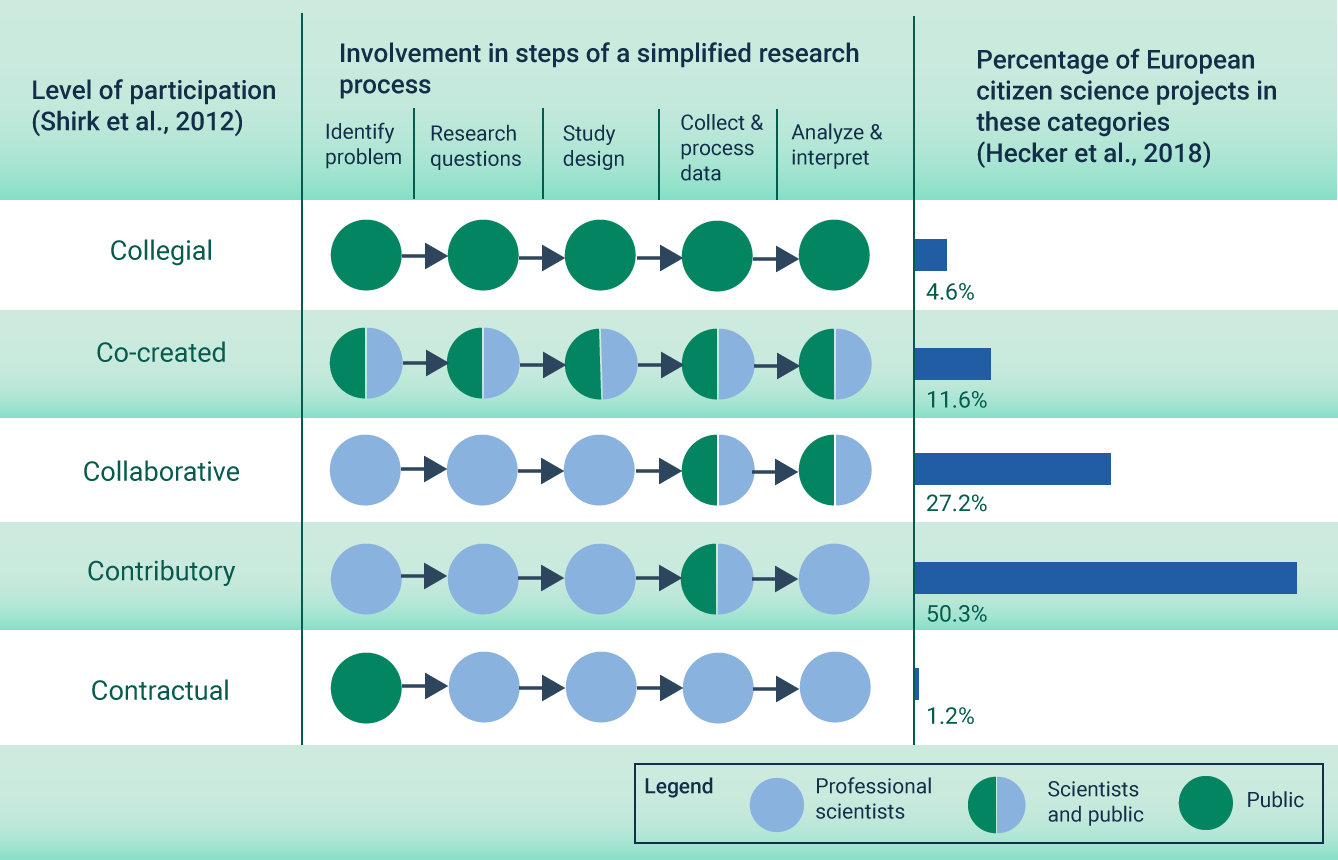Volunteer Engagement in Citizen Science
Introduction to Volunteer Engagement in Citizen Science
"Citizen science" is an umbrella term for many different practices involving volunteers in scientific research (Haklay et al., 2021). To give some examples, people might add their observations of wild animals and plants to a public data base, help to transcribe historical prison records, or co-create maps from aerial photography to document the extent of the Deepwater Horizon oil spill.
The term citizen science itself originated from two different schools of thought: Bonney (1996) used the term to describe volunteer contributions to natural sciences, to help professional researchers collecting or annotating large amounts of data. On the other hand, Irwin (1995) understood the concept of citizen science as a form of active citizenship, e.g. as a way for communities to collect scientific evidence to address local issues and advocate for their rights.
Since then, many researchers have tried to formalize the understanding of citizen science by developing a multitude of frameworks (see Schrögel and Kolleck (2019) for a review). A frequently used framework is that of Shirk et al. (2012), where projects are categorized by the steps of research that the public can participate in (see Figure 1). These projects range from "contractual" and "contributory", where volunteers contribute to the idea, or the data collection or annotation, to "co-created" projects, where they are involved in all steps. In "collegiate" projects, the whole project is done by volunteers, sometimes with no academic institutions involved at all.

In a survey about the European citizen science landscape Hecker et al. (2018) found that the majority of projects fall into the "contributory" category (see Figure 1). Thinking about co-created or collegial projects, it seems obvious that these projects face more barriers: Integrating citizen scientists into all steps of research is a more complex challenge, including skill-building regarding research methods, or access to resources like labs or consumables, or access to processes like ethics review (see Greshake Tzovaras et al. (2021) for an essay regarding these challenges in biomedical research).
Thus, it remains an open challenge to explore ways and develop tools to support these types of participatory or citizen-led research. In my PhD, I took one step into this direction, by exploring "peer production" to support self-organizing communities in citizen science.
References
- Bonney, R. (1996). Citizen science: A lab tradition. Living Bird, 15(4), 7-15.
- Greshake Tzovaras, B., Rera, M., Wintermute, E. H., Kloppenborg, K., Ferry-Danini, J., Aidelberg, G., … & Misevic, D. (2021). Empowering grassroots innovation to accelerate biomedical research. PLoS Biology, 19(8). https://doi.org/10.1371/journal.pbio.3001349
- Haklay, M., Fraisl, D., Greshake Tzovaras, B., Hecker, S., Gold, M., Hager, G., … & Vohland, K. (2021). Contours of citizen science: a vignette study. Royal Society open science, 8(8). https://doi.org/10.1098/rsos.202108
- Hecker, S., Garbe, L., & Bonn, A. (2018). The European citizen science landscape–a snapshot. In Hecker, Haklay, Bowser, Makuch, Vogel, Johannes, & Bonn (Eds.), Citizen Science: Innovation in Open Science, Society and Policy (pp. 190-200). UCL Press. https://www.uclpress.co.uk/products/107613
- Irwin, A. (1995). Citizen science: a study of people, expertise, and sustainable development. Routledge.
- Schrögel, P., & Kolleck, A. (2019). The many faces of participation in science: Literature review and proposal for a three-dimensional framework. Science & Technology Studies, 32(2), 77-99. https://doi.org/10.23987/sts.59519
- Shirk, J. L., Ballard, H. L., Wilderman, C. C., Phillips, T., Wiggins, A., Jordan, R., … & Bonney, R. (2012). Public participation in scientific research: a framework for deliberate design. Ecology and society, 17(2). http://dx.doi.org/10.5751/ES-04705-170229
- Strasser, B., Baudry, J., Mahr, D., Sanchez, G., & Tancoigne, E. (2019). “ Citizen science”? Rethinking science and public participation. Science & Technology Studies, 52-76. https://doi.org/10.23987/sts.60425